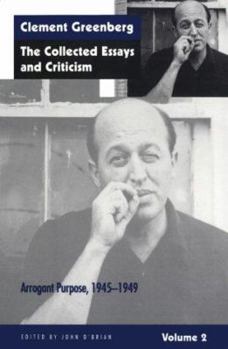The Collected Essays and Criticism, Volume 2: Arrogant Purpose, 1945-1949
Select Format
Select Condition 
Book Overview
Clement Greenberg (1909-1994), champion of abstract expressionism and modernism--of Pollock, Mir , and Matisse--has been esteemed by many as the greatest art critic of the second half of the twentieth century, and possibly the greatest art critic of all time. On radio and in print, Greenberg was the voice of "the new American painting," and a central figure in the postwar cultural history of the United States. Greenberg first established his reputation writing for the Partisan Review, which he joined as an editor in 1940. He became art critic for the Nation in 1942, and was associate editor of Commentary from 1945 until 1957. His seminal essay, "Avant-Garde and Kitsch" set the terms for the ongoing debate about the relationship of modern high art to popular culture. Though many of his ideas have been challenged, Greenberg has influenced generations of critics, historians, and artists, and he remains influential to this day.
Format:Paperback
Language:English
ISBN:0226306224
ISBN13:9780226306223
Release Date:February 1988
Publisher:University of Chicago Press
Length:374 Pages
Weight:0.90 lbs.
Dimensions:0.9" x 5.6" x 8.5"
Customer Reviews
1 rating
Greenberg's Essays
Published by Thriftbooks.com User , 24 years ago
The most exciting thing about reading Clement Greenberg's essays is trying to decide how relevant is what he writes in the art world today and how relevant is his work to me as an artist. I read each essay hoping that the next one will give me yet another clue to this queston. The secret dream of what l want art to be - art that is verifiably good and bad through objective aesthetic sensibility - is the core of what Greenberg's essays are about and what makes them so seductive and so painful to read.





